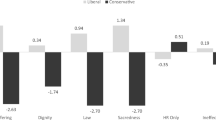Abstract
This study investigated the most common irrational beliefs among samples of: (1) convicted terrorists and (2) extremists, all of whom were prisoners in the country of Jordan. It also investigated the effectiveness of a program of disputing irrational beliefs (DIBP) with the same populations. The subjects were assigned randomly to two groups: an experimental group (EG) that consisted of 43 prisoners who received an training program, and a control group that consisted of 48 prisoners who received no training. The irrational beliefs scale (IBS) scores were assessed for both groups before and after exposure to the DIBP. To test the hypotheses of the study, means and standard deviations of the IBS measures were submitted to a two-way analysis of covariance. The results revealed that the most common irrational belief loaded on the factors of musts, exaggerations, and perfectionism. Moreover, the results revealed significant differences between the means of the two groups on the total IBS scores at post-test, with the EG scoring lower, which indicated the effectiveness of the training program in reducing the level of IBS. The results yielded significant differences in the effect of the reason for imprisonment in favor of extremists and the interaction between the reason for prison and treatment in favor of the EG and extremists.

Similar content being viewed by others
References
Abdulagatov, Z. M. (2013). The influence of the religious factor on the extremist behavior of Dagestani youth. Russian Education and Society, 55(2), 67–81. https://doi.org/10.2753/RES1060-9393550203.
Aldahadha, B. (2007). Violence, terrorism, suicide from socio psych-perspective: The reasons, effects and interventions. http://www.gulfkids.com/pdf/Onf_Erhab.pdf. Accessed February 11, 2017.
Aldahadha, B. (2008). The effectiveness of two group-counseling programs in disputing irrational thoughts and self-assertiveness, in reducing depression and enhancing self-concept, among depressed students. Journal of Umm Al-Qura University Psychological and Educational Sciences, 20(1), 11–18.
Aldahadha, B. (2017). The extremism beliefs between the French rebellion and Stalin rebellion. http://www.ammonnews.net/article/296801. Accessed February 11, 2017.
Caplan, J. (2000). The psychology of cults, violence and religion: Rational emotive therapy as a psychotherapeutic treatment: A case study. Carlos Albizu University, ProQuest Dissertations Publishing, UMI Number 9975594.
Coppock, V., & McGovern, M. (2014). ‘Dangerous minds’? Deconstructing counter-terrorism discourse, radicalization and the ‘psychological vulnerability’ of Muslim children and young people in Britain. Children and Society, 28(3), 242–256. https://doi.org/10.1111/chso.12060.
Davis, M., Eshelman, E. R., & McKay, M. (2000). The relaxation and stress reduction workbook. Oakland: New Harbinger Publications.
Davydov, D. G. (2015). The causes of youth extremism and ways to prevent it in the educational environment. Russian Education and Society, 57(3), 146–162. https://doi.org/10.1080/10609393.2015.1018745.
Di Paolo, M. R. (2016). A brief rational disputation exercise enhances cardiovascular, anxiety, and affective recovery following worry-recall. Dissertation Abstracts, the University of Wisconsin-Milwaukee, ProQuest Number: 10124143.
DiGiuseppe, R., Doyle, K., Dryden, W., & Backx, W. (2014). A practitioner’s guide to rational emotive behavior therapy. Oxford: Oxford University Press.
Dryden, W. (2012). Flexibility and passionate non-extremism versus absolutism and extremism: Teaching the basics of REBT theory and showing its wider applicability. Journal of Rational-Emotive and Cognitive-Behavior Therapy, 30(1), 38–51. https://doi.org/10.1007/s10942-010-0119-8.
Ellis, A. (1986). Fanaticism that may lead to a nuclear holocaust: The contributions of scientific counseling and psychotherapy. Journal of Counseling and Development, 65(3), 146–151.
Ellis, A. (1994). Reason and emotion in psychotherapy. New York, NY: Birch Lane Press.
Ellis, A. (2004). The road to tolerance: The philosophy of rational emotive behavior therapy. New York, NY: Prometheus Books.
Ellis, A., & Joffe-Ellis, D. (2011). Rational emotive behavior therapy. Washington, DC: American Psychological Association.
Friedman, M., & Rholes, W. (2009). Religious fundamentalism and terror management: Differences by interdependent and independent self-construal. Self and Identity, 8, 24–44. https://doi.org/10.1080/15298860801984788.
Harrington, N. (2013). Irrational beliefs and socio-political extremism. Journal of Rational-Emotive and Cognitive-Behavior Therapy, 31, 167–178. https://doi.org/10.1007/s10942-013-0168-x.
Hyland, P., & Boduszek, D. (2012). A unitary or binary model of emotions: A discussion on a fundamental difference between cognitive therapy and rational emotive behavior therapy. Journal of Humanistic and Social Sciences, 1(1), 49–61.
Laor, N., Yanay-Shani, A., Wolmer, L., & Khoury, O. (2010). A trauma-like model of political extremism: Psycho-political fault lines in Israel. Annals of the New York Academy of Science, Psychiatric and Neurologic Aspects of War, 1208, 24–31. https://doi.org/10.1111/j.1749-6632.2010.05693.x.
Lohr, J. M., & Bonge, D. (1980). Retest reliability of the irrational beliefs test. Psychological Reports, 47(3), 1314.
Neenan, M., & Dryden, W. (1999). Rational emotive behavior therapy: Advances in theory and practice. London: Whurr.
Nizami, A. T., Rana, M. H., Hassan, T. M., & Minhas, F. A. (2014). Terrorism in Pakistan: A behavioral sciences perspective. Behavioral Sciences and the Law, 32(3), 335–346. https://doi.org/10.1002/bsl.2118.
Robertson, D. (2010). The philosophy of cognitive-behavioral therapy (CBT): Stoic philosophy as rational and cognitive psychotherapy. London: Karnac Books.
Schorn, D. (2006). Ed Bradley reports on extremists now deemed biggest domestic terror threat. 60 Minutes. Wikipedia. http://www.soc.iastate.edu/sapp/Terrorism.pdf. Accessed May 15, 2017.
Turner, M. J., & Barker, J. B. (2015). Examining the effects of rational emotive behavior therapy (REBT) on the irrational beliefs of blue-chip professionals. Journal of Rational-Emotive and Cognitive-Behavior Therapy, 33(1), 17–36. https://doi.org/10.1007/s10942-014-0200-9.
Acknowledgements
The research leading to these results received funding from Mutah University under the Grant Agreement No. 390/14/120.
Author information
Authors and Affiliations
Corresponding author
Ethics declarations
Conflict of interest
Author declares that he has no conflict of interest.
Rights and permissions
About this article
Cite this article
Aldahadha, B. Disputing Irrational Beliefs Among Convicted Terrorists and Extremist Beliefs. J Rat-Emo Cognitive-Behav Ther 36, 404–417 (2018). https://doi.org/10.1007/s10942-018-0293-7
Published:
Issue Date:
DOI: https://doi.org/10.1007/s10942-018-0293-7



